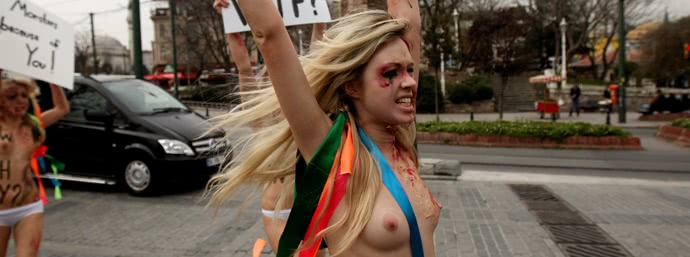It’s a titillating image, of course, but that’s the idea. Entice media with the promise of gorgeous, topless girls protesting in very public spaces. It works, too; byUkraine Is Not A Brotheldirector Kitty Green’s reckoning, Ukrainian activist group Femen draws upwards of 150 cameras to their protests.
And while the nudity is inherent to Femen’s ideology – encouraging women to reclaim control over their bodies and political rights in a country too often associated with little more than sex tourism – there is much more to the organisation. There is great fear and violence in the activists’ lives, perpetrated by aggressive police, confused members of the public, and, perhaps most troubling, within their own ranks.
“I spent 14 months living with these girls, so I was privy to a lot of intimate moments. Some people have said that there’s too much nudity in the film, but that’s just the way we lived. These girls were always naked, so I was just shooting them in their natural habitat,” Green laughs. “Getting those moments, it offers a glimpse into their real lives, gives you that human impact of what they’re doing. Like that moment with Oksana bathing. She’s battered, covered in bruises; she’s washing away the slogans painted all over her skin. There’s a lot of metaphorical imagery that gets captured.”
By living so closely with the girls (the cinematographer slept on the floor of their crumbling two-bedroom apartment for over a year), Green was able to develop a level of trust and insight that many other documentarians have shied away from.
“Every journalist I met – particularly with The New York Times or the BBC, everybody comes to cover these girls and their activities – would warn, ‘Oooh, don’t get too close to them, you’ll lose all objectivity, you certainly can’t live with them.’ All of these warnings about what would happen. What I think is the beauty of the film is the honesty and the intimacy of it, and that could only really happen by gaining their trust. I could be so close to them that I could see what was going on and point out contradictions, to get them to honestly open up to the camera, which could only happen if I was their friend and colleague. I got arrested with them several times, and I think it’s that trust that got us the story.”
The film is peppered with instances of the girls being dragged away from protests, and with stories of brutality and humiliation at the hands of authority. One of its most disquieting aspects, however, lies much closer to home. Victor Svyatski, the intense, menacing man who formerly organised Femen’s protests and shaped their message, is a truly disturbing figure whose influence over the girls is at times quite distressing.
“He’s terrifying,” Green agrees matter-of-factly. “I spent all this time pretending not to shoot him – I was told I wasn’t allowed to – so I would always point the camera at the floor while he was around, try to secretly record him.
“When I phoned him to say I had all of this secret footage, he just started screaming at me, and I was terrified; I really thought he was capable of anything. He eventually agreed to an interview, but I wanted to make sure I had a friend nearby in case he got violent. I’d seen him be very aggressive with the girls. We got what we wanted, but at the end of the day, I kind of think I convinced him through his ego, you know? He really wanted to be in front of a camera, he was sick of being in the shadows. So I was able to take advantage of that, and the moment it was done, I knew I had to get out of Kiev straight away.”
Ukraine Is Not A Brothel is a part of the Documentary Australia Foundation Award for the Sydney Film Festival. Full program and tickets available online.

































